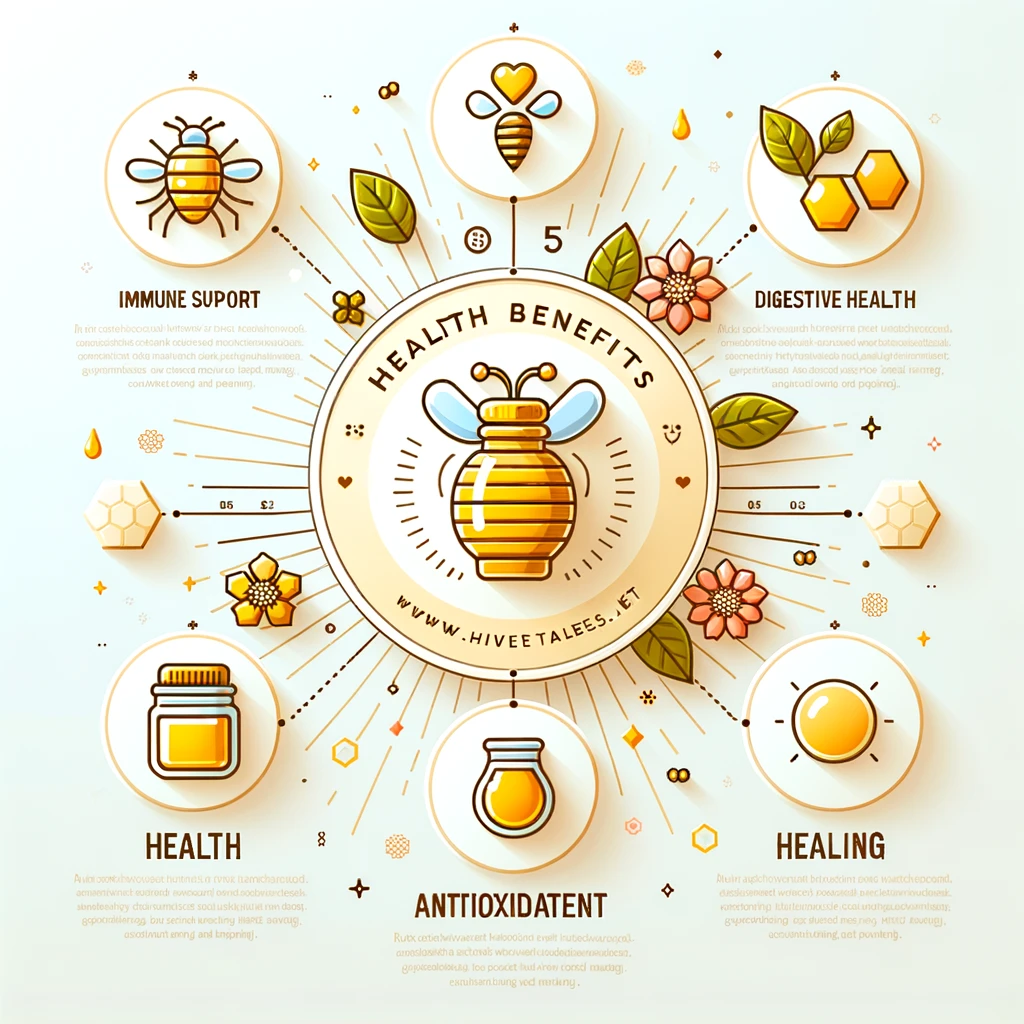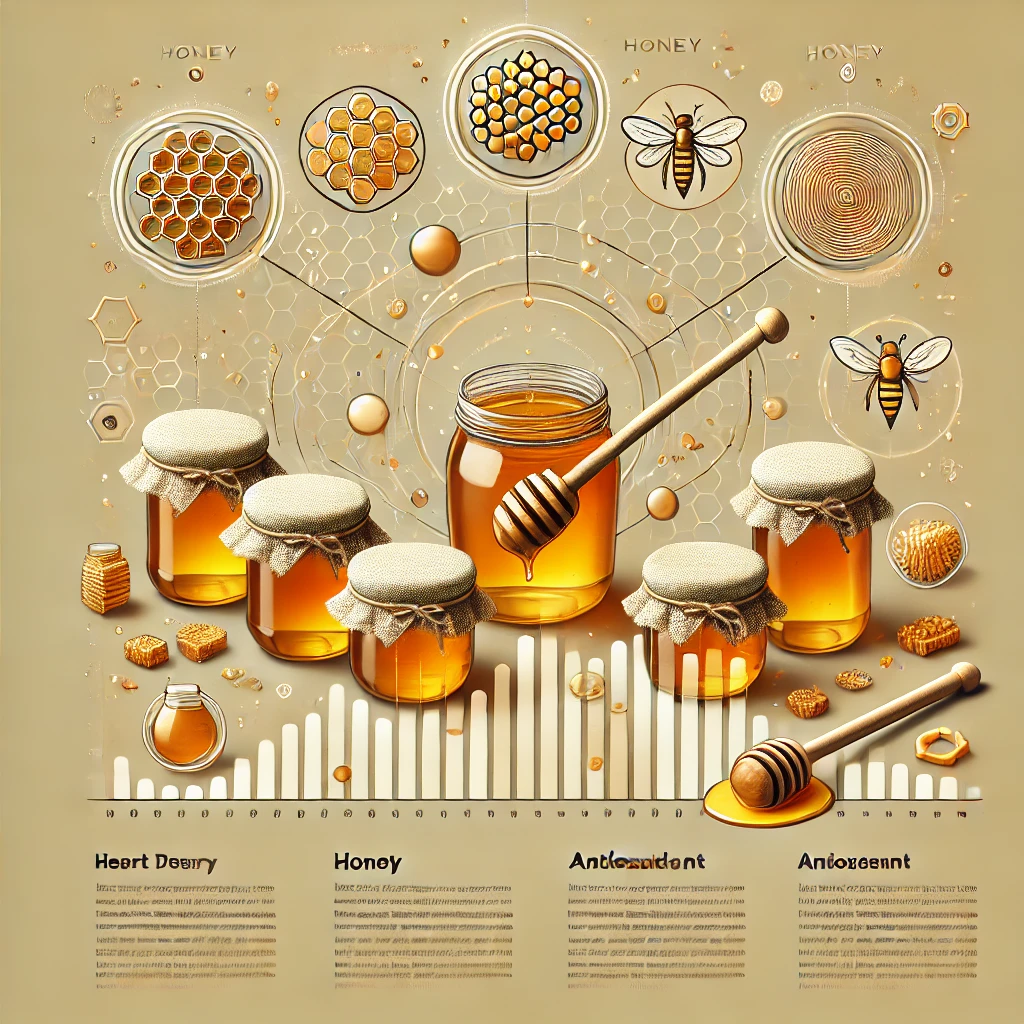The Latest Scientific Research on Honey’s Health Benefits

The latest research on health benefits of honey reveals surprising insights into its long-standing reputation as a natural remedy. From immune-boosting properties to supporting digestive health, modern studies are bringing these benefits into sharper focus and solidifying honey’s role as a powerful health aid. Let’s take a closer look at the latest findings:
- Immune System Support: Recent studies show that honey, particularly varieties like Manuka, can stimulate the production of immune cells. Research suggests that honey’s antioxidant and antimicrobial properties may help the body defend against infections more effectively Health Benefits of Honey.
- Digestive Health: Honey contains prebiotics that feed the beneficial bacteria in your gut. This can improve digestion and overall gut health. Clinical studies have confirmed that honey promotes a healthy balance of gut bacteria, helping with issues like bloating and indigestion.
- Antioxidant Powerhouse: Antioxidants are essential for fighting free radicals, which can damage cells and lead to chronic conditions like heart disease. Honey, especially darker varieties, is rich in antioxidants like flavonoids and polyphenols, which contribute to better heart and overall health.
- Wound Healing: The science behind honey’s ability to heal wounds is well established. New clinical trials have further confirmed that honey’s antibacterial properties speed up healing and reduce infection in wounds and burns, making it an effective natural remedy for minor injuries Honey for Skincare.
“Honey has been shown to have anti-inflammatory, antimicrobial, and antioxidant properties, which help explain its wide range of health benefits.”
– Dr. Peter Molan, Biochemist, University of Waikato (Known for his research on Manuka honey)
By looking at this research, we can see that honey is more than just a natural sweetener—it’s a functional food that offers multiple health benefits. This is why understanding the latest scientific studies on honey is so important for anyone looking to make informed choices about their health.
General Health Benefits of Honey: What Science Says

When we think of honey, we often imagine a sweet addition to tea or toast. But according to the latest research, honey’s health benefits go far beyond satisfying your sweet tooth.
1. What Are the Main Health Benefits of Honey?
Research consistently shows that honey can offer a variety of health benefits, from boosting energy to supporting heart health. Its antimicrobial and antioxidant properties make it a go-to remedy for everyday health concerns like sore throats and digestive issues. Studies have shown that honey can help reduce inflammation, support the immune system, and even promote wound healing.
2. Is Honey Better Than Sugar?
You might wonder if honey is a healthier alternative to sugar. The short answer? Yes, in moderation. Honey has a lower glycemic index (GI) than regular sugar, which means it doesn’t spike your blood sugar levels as quickly. It also contains trace amounts of vitamins, minerals, and antioxidants that sugar lacks. That said, honey is still high in natural sugars, so it’s essential to use it mindfully. But if you’re choosing between the two, research suggests that honey offers more nutritional value than plain sugar.
3. Can Honey Help with Weight Loss?
The idea that honey can help with weight loss might sound too good to be true, but there’s science to back it up. Some studies indicate that honey can aid in weight management by helping to regulate blood sugar levels and suppress appetite. Its natural sweetness allows you to reduce sugar intake in your diet, which is often a key factor in losing weight. However, as with all sweeteners, portion control is crucial.
Honey’s benefits, supported by modern science, make it much more than just a pantry staple. Whether you’re using it as a natural sweetener or incorporating it into your health routine, honey’s potential for boosting overall wellness is clear.
How Honey Can Help with Specific Health Conditions
Honey is more than just a natural remedy passed down through generations. Scientific studies have started to validate what many traditional cultures have known for centuries—honey has the potential to alleviate symptoms of various health conditions.
Honey for Sore Throats and Coughs: Nature’s Soothing Remedy
One of the most well-known uses for honey is as a remedy for sore throats and coughs. Research backs this up, showing that honey can be just as effective—if not more—than some over-the-counter cough suppressants. A 2021 study found that honey’s antimicrobial properties help fight infection, while its thick consistency coats the throat, providing soothing relief. Next time you feel a scratchy throat coming on, try a spoonful of honey before reaching for medication.
“Honey is a time-tested remedy for cough and sore throat. It coats the throat and has mild antibacterial properties that help soothe irritation.”
– Dr. James Steckelberg, Mayo Clinic
Can Honey Improve Sleep Quality?
Struggling to get a good night’s sleep? Honey might help. Some studies suggest that consuming honey before bed can increase melatonin production, the hormone that regulates sleep. This is because honey slightly raises your insulin levels, which helps tryptophan enter the brain, boosting melatonin and leading to better sleep quality. Adding honey to warm milk or tea before bed could be a natural, calming solution to help you drift off faster.
Honey and Heart Health: What the Latest Research Reveals
Honey’s heart health benefits are gaining attention in scientific circles. Its antioxidants, particularly flavonoids, are known to reduce inflammation, which plays a key role in preventing cardiovascular diseases. A 2020 study highlighted that regular consumption of honey might help lower blood pressure, reduce bad cholesterol (LDL), and improve good cholesterol (HDL) levels. Incorporating honey into your diet could be a sweet way to protect your heart.
With these findings, honey proves to be more than just a kitchen staple—it’s a potential tool for managing everyday health concerns. Whether you’re looking for relief from a sore throat, better sleep, or improved heart health, honey’s natural properties make it a valuable addition to your wellness routine.
Honey Composition and Safe Consumption
While honey is praised for its health benefits, what’s inside this golden liquid is what makes it truly remarkable. Understanding its composition and how much to consume can help you make informed decisions about including honey in your diet.
What Specific Compounds in Honey Are Responsible for Its Health Benefits?
Honey is packed with natural compounds that contribute to its health-boosting properties. These include:
- Flavonoids and Polyphenols: These antioxidants help fight oxidative stress, reducing the risk of chronic diseases like heart disease and cancer.
- Enzymes: Honey contains natural enzymes like glucose oxidase, which produce hydrogen peroxide, giving honey its antibacterial properties.
- Vitamins and Minerals: Honey is a source of small amounts of vitamins like B6, riboflavin, and minerals such as calcium and potassium. While not significant in large quantities, these nutrients add to honey’s overall benefits.
It’s this unique combination of nutrients and enzymes that makes honey a superfood for many health-conscious individuals.
How Much Honey Should You Consume Daily?
Though honey is packed with health benefits, it’s important to consume it in moderation. The World Health Organization (WHO) recommends keeping your added sugar intake to less than 10% of your daily calories, and honey falls into this category. Generally, 1-2 tablespoons of honey per day are sufficient to enjoy its benefits without overdoing the sugar. Keep in mind that honey is still high in natural sugars, so portion control is key to making it a healthy addition to your diet.
Can People with Diabetes Safely Consume Honey?
People with diabetes often wonder whether honey is a safer option than sugar. While honey has a lower glycemic index (GI) than sugar, meaning it raises blood sugar more slowly, it should still be consumed with caution. Some studies suggest that honey may help in blood sugar regulation, but it’s always best to consult with a healthcare provider before making it a regular part of your diet. For diabetics, small amounts of honey might be safe, but it’s essential to monitor blood sugar levels carefully.
Understanding the components of honey and how to consume it safely can help you maximize its health benefits without the risks of overconsumption. Remember, like any natural product, balance is key.
Honey for Skin and Hair: Nature’s Beauty Secret

Honey isn’t just for your health; it’s also a beauty secret that has been used for centuries. Recent studies and beauty experts alike are turning to honey for skin and hair care because of its natural, nourishing properties. Let’s explore why honey is quickly becoming a staple in natural beauty routines.
Is Honey Good for Your Skin?
Absolutely! Honey is packed with antioxidants and has humectant properties, which means it helps retain moisture in the skin. According to a 2021 study, honey can improve skin hydration, making it an effective remedy for dry or irritated skin. Additionally, honey’s antibacterial properties can help in fighting acne. It works by reducing inflammation and keeping the skin clean from harmful bacteria.
- Pro Tip: Try using raw honey as a gentle face mask to hydrate and soothe your skin. Apply a thin layer, leave it on for 15-20 minutes, and rinse off with warm water.
How Can Honey Be Used in Skincare Routines?
From face masks to scrubs, honey has countless uses in skincare. It can act as a natural exfoliant when mixed with sugar, or as a calming agent for sensitive skin when blended with aloe vera. Here’s a quick list of ways you can incorporate honey into your routine:
- Hydrating face mask: Raw honey alone or mixed with yogurt for added moisture.
- Acne treatment: Spot treat with honey on acne-prone areas to reduce inflammation.
- Exfoliating scrub: Mix honey with brown sugar for a gentle, natural exfoliant.
Honey’s versatility makes it easy to add to your skincare regimen, no matter your skin type.
Is Honey Good for Your Hair?
Honey isn’t just great for your skin—it can work wonders for your hair, too. Rich in antioxidants, honey helps restore shine and smoothness to damaged or dull hair. A 2020 study showed that honey could strengthen hair follicles, promoting healthier hair growth. It also has emollient properties, which soften hair and help it retain moisture, making it an ideal natural conditioner.
- Pro Tip: Try mixing honey with coconut oil for a DIY hair mask that can leave your hair soft and shiny. Leave the mixture on your hair for about 30 minutes before washing it out.
By incorporating honey into your skin and hair care routines, you’re tapping into a powerful, natural solution for beauty. Whether you’re looking for hydration, acne treatment, or a hair boost, honey’s natural properties make it a versatile and effective option.
Latest Research on Honey’s Role in Disease Prevention

Beyond its traditional uses in health and beauty, honey is now gaining attention for its potential in preventing and managing serious diseases. Modern research is uncovering how honey’s unique properties may help reduce the risk of certain illnesses, including heart disease, infections, and even cancer. Let’s dive into the latest findings.
Honey and the Immune System: A Natural Booster
One of the standout benefits of honey is its immune-boosting properties. Recent research has shown that honey, particularly Manuka honey, can enhance the immune system by promoting the production of immune cells. Studies suggest that the antioxidants and antibacterial compounds found in honey, like methylglyoxal (MGO), play a role in fighting off infections and strengthening the body’s natural defenses.
What does this mean for you? Adding honey to your daily diet may help your body fend off common illnesses, from colds to more serious infections. Plus, honey’s natural antimicrobial properties make it a great choice for soothing coughs and colds without relying on over-the-counter medications Health Benefits of Honey.
Can Honey Help Prevent Cancer? What the Research Says
While more research is needed, some studies suggest that honey might have potential in cancer prevention. Its high levels of antioxidants help neutralize free radicals, which can damage cells and lead to the development of cancer. Additionally, a 2022 study found that certain types of honey, such as Tualang honey, may inhibit the growth of cancer cells in lab studies.
Although honey is not a cure for cancer, incorporating antioxidant-rich foods like honey into your diet could help reduce your overall cancer risk. Always consult with a healthcare professional before using honey as part of any treatment plan.
“Honey’s polyphenols are powerful antioxidants that may reduce the risk of cardiovascular disease.”
– Dr. David Heber, UCLA Center for Human Nutrition
Honey’s Role in Reducing Inflammation
Chronic inflammation is a key factor in many diseases, including heart disease and diabetes. The good news? Honey has been shown to reduce inflammation in the body. A study published in 2021 found that honey’s flavonoids and polyphenols are responsible for its anti-inflammatory effects. By reducing inflammation, honey could contribute to lower risks of chronic conditions and better overall health.
- Pro Tip: Combine honey with other anti-inflammatory foods like ginger and turmeric for an even greater health boost.
How Does Honey Compare in Traditional vs. Modern Medicine?
Honey has been used in traditional medicine for centuries to treat everything from wounds to digestive issues. But what does modern science say? Research continues to support many of the traditional uses of honey, especially for wound healing and soothing throat ailments. In contrast, modern applications are exploring honey’s broader potential, such as its role in preventing disease and improving metabolic health.
For example, while honey’s use in wound care dates back thousands of years, modern clinical trials confirm that honey dressings can promote faster healing and reduce the risk of infection. This makes honey a bridge between ancient wisdom and modern medical practice.
As the research evolves, one thing is clear: honey’s potential as a preventative health measure is undeniable. From boosting immunity to reducing inflammation and possibly aiding in cancer prevention, honey is more than just a sweet treat—it’s a powerful natural ally in the fight against chronic diseases.
Raw vs Processed Honey: Which Is Healthier?
When it comes to honey, not all types are created equal. The debate between raw and processed honey often leaves people wondering which one is better for their health. To help you make an informed choice, let’s take a look at the differences between the two and what recent studies suggest.
What Is the Difference Between Raw and Processed Honey?
- Raw Honey: This is honey in its purest form. It is typically unfiltered and unpasteurized, meaning it retains all of its natural enzymes, vitamins, minerals, and antioxidants. It may contain small amounts of bee pollen, propolis, and wax, which contribute to its health benefits.
- Processed Honey: Also known as pasteurized honey, this version has been heated and filtered to remove impurities and extend its shelf life. Unfortunately, the heating process can destroy many of the beneficial enzymes and antioxidants found in raw honey, reducing its overall health value.
“Raw honey is packed with antioxidants and enzymes, making it far more beneficial than processed honey.”
– Dr. Ron Fessenden, Author of “The Honey Revolution”
Which Is Better for Health: Raw or Processed Honey?
The short answer: raw honey is generally better for your health. Studies show that raw honey retains its natural antioxidant and antimicrobial properties, which are often lost during the pasteurization process. These properties contribute to many of the health benefits associated with honey, such as reducing inflammation and boosting the immune system Health Benefits of Honey.
For example, research from 2020 demonstrated that raw honey contains higher levels of phenolic compounds, which are known for their antioxidant effects. These antioxidants can help protect your body from free radical damage, reducing the risk of chronic diseases like heart disease and cancer.
When to Choose Processed Honey
While raw honey is typically the healthier option, processed honey still has its place. If you’re looking for honey with a longer shelf life or prefer honey that is crystal-clear for aesthetic purposes (such as for baking or in tea), processed honey may be more convenient. However, if you want to maximize the health benefits, raw honey should be your go-to choice.
How to Choose the Best Quality Honey
When shopping for honey, it’s essential to look for labels like “raw” or “unfiltered” to ensure you’re getting the most out of its natural properties. Additionally, some brands offer specialty honey, like Manuka or Tualang honey, which may have even more potent health benefits due to their unique compositions. Always check the source and ensure that your honey is ethically and sustainably sourced.
In conclusion, if you’re seeking honey for its health benefits, raw honey is the superior choice. Packed with antioxidants, enzymes, and other beneficial compounds, raw honey provides a natural way to boost your overall well-being. Processed honey can still be used for culinary purposes, but when it comes to health, raw honey reigns supreme.
How to Choose and Consume Honey Safely
Honey is a powerful natural remedy, but like any food, it’s important to know how to choose the best quality and consume it safely. Not all honey is created equal, and understanding the right way to use honey will ensure you’re getting its maximum benefits without overdoing it.
How Much Honey Should You Consume Daily?
Although honey is packed with beneficial compounds, it’s still high in natural sugars. The key to enjoying honey’s health benefits without the risks of excess sugar is moderation. According to the American Heart Association, it’s best to limit added sugars to about 6 teaspoons (25 grams) for women and 9 teaspoons (36 grams) for men per day. This includes honey.
So, how does honey fit into this? One tablespoon of honey contains about 17 grams of sugar, meaning that even just 1-2 tablespoons a day could take you close to or beyond the recommended sugar limit. For most people, enjoying honey in small amounts—perhaps added to tea or yogurt—can be part of a healthy diet without the risks of overconsumption.
Are There Any Side Effects of Consuming Honey?
For most people, honey is safe when consumed in moderation, but there are a few important considerations:
- For Infants: Honey should never be given to children under 1 year old due to the risk of botulism, a serious type of food poisoning.
- For Diabetics: As honey still contains sugars, diabetics should be cautious. While honey has a lower glycemic index than sugar, it can still raise blood sugar levels. Always consult your doctor if you’re diabetic and considering adding honey to your diet.
- Allergies: Some people may experience allergic reactions to honey, especially if they are allergic to pollen. Symptoms could range from mild irritation to more serious reactions, such as swelling or difficulty breathing.
How Can You Choose the Best Quality Honey?
When selecting honey, always look for terms like “raw,” “organic,” or “unfiltered” on the label. These indicate that the honey has undergone minimal processing, keeping its natural nutrients intact. Here are a few tips:
- Go for Local Honey: Local honey often contains pollen from local plants, which may help alleviate seasonal allergies, though the research is mixed on this.
- Check for Certifications: Look for certifications that confirm the honey is organic or ethically sourced, which ensures you’re getting a pure product without added sugars or chemicals.
- Consider Specialty Honeys: Types like Manuka honey have gained attention for their potent antimicrobial properties. However, be sure to verify the UMF (Unique Manuka Factor) rating to ensure authenticity.
By following these guidelines, you can enjoy the health benefits of honey without any concerns. Moderation is key, and choosing the right kind of honey ensures you’re making the healthiest choice possible. Whether you’re using it as a sweetener or a natural remedy, quality matters.
Conclusion: The Future of Honey in Health and Wellness

As we’ve explored, honey is far more than just a sweet treat—it’s a powerful natural substance with a wide range of health benefits, backed by both traditional wisdom and modern science. Whether you’re looking to boost your immune system, improve your skin, or even support your heart health, the latest research on honey shows that it can be a valuable addition to a balanced, health-conscious lifestyle.
Key Takeaways from the Latest Research
- Honey’s antioxidant and antimicrobial properties make it a natural remedy for sore throats, wound healing, and boosting overall immunity Health Benefits of Honey.
- Studies suggest that honey can help reduce inflammation, which plays a significant role in preventing chronic diseases like heart disease and diabetes.
- Raw honey remains the best option for maximum health benefits, retaining more nutrients and enzymes compared to processed varieties.
- Moderation is essential when consuming honey. Its natural sugars are healthier than refined sugar, but it’s still important to monitor your intake, especially for those with diabetes.
What’s Next?
As ongoing research continues to explore the potential of honey, we may discover even more about how it can be used for health and wellness. From its role in fighting infections to its potential in reducing cancer risks, honey’s future in medicine and nutrition looks promising.
A Final Word of Caution
While honey offers many health benefits, it’s crucial to remember that it’s not a miracle cure. Using honey as part of a healthy lifestyle—balanced with other nutrient-rich foods—can help you reap its rewards. If you’re considering using honey for specific health conditions, such as diabetes or heart disease, be sure to consult a healthcare provider.
Want to learn more about how honey can enhance your health? Be sure to check out our related articles, including “Health Benefits of Honey” and “How to Use Honey for Skincare”, or watch our latest video on “The Best Honey Varieties for Wellness” on YouTube.
References
MDPI – A Comprehensive Review of the Effect of Honey on Human Health
This peer-reviewed article explores clinical trials analyzing honey’s impact on cardiovascular health, glucose regulation, and wound healing. It’s a detailed and science-backed source that covers the antioxidant, anti-inflammatory, and antimicrobial properties of honey. Read the full study here – MDPI.
Monash University – The Sweet Science of Honey: Exploring the Health Benefits
This research article dives into the benefits of different types of honey, such as Manuka and Tualang honey, discussing their antimicrobial and antioxidant properties. It’s especially relevant if you are discussing specific varieties of honey. Learn more here – Monash University.
Health Benefits Times – Research-Validated Health Benefits of Honey
This post offers a research-backed overview of honey’s benefits in wound healing, inflammation reduction, and even its use in supporting cancer patients. It’s a great source for real-world applications of honey in medical scenarios. Check the article here – Health Benefits Times.
MOFT Archive – 21 Science-Backed Health Benefits of Honey
A general yet in-depth look at honey’s nutritional benefits, its role in digestive health, and how its antioxidant properties can aid in disease prevention. This blog supports its claims with references to scientific studies. Read more here – MOFT Archive.
